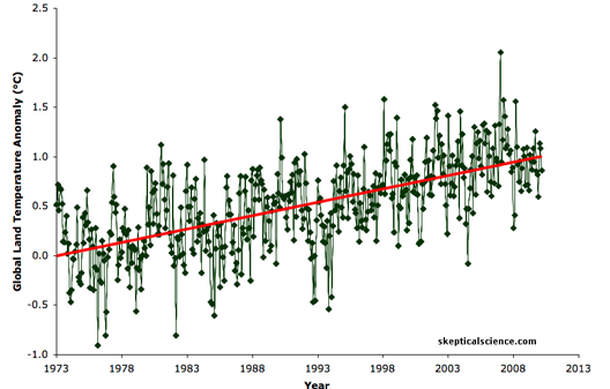Create a free profile to get unlimited access to exclusive videos, sweepstakes, and more!
A case study of the tactics of climate change denial, in which I am the
target

Over the years I have pointed out the fallacious arguments of climate change deniers when they attack legitimate climatologists like James Hansen and Michael Mann. This is, of course, like kicking at a bee hive, and whenever I do the comments section of my posts fill with lots of angry buzzing.
But now, for what I think is the first time, I find myself the target of an attack. And I have to admit, I welcome it: it's a textbook case of denialist sleight of hand, of distraction, distortion, error, and misdirection.
Stick around for all of this. It'll be... interesting.
Our story so far
OK, first, here's the scoop: a few days ago, I wrote a blog post taking apart two intellectually bankrupt climate change denial articles, one in the Wall Street Journal, and the other in the UK's Daily Mail. Both were claiming that global warming appears to have stopped in the past few years, a claim which is trivially easy to show wrong. In fact, I linked to two articles doing just that: one at Skeptical Science, and another I myself wrote. Finding actual scientists destroying that claim is not hard at all; those two links have many more links therein.
In my post about the WSJ and DM, I included a graph. It pretty clearly shows temperatures rising from 1973 to the present. And this is where the fun begins.
That's the plot. It's from a recent, independent study done at Berkeley, and represents actual, measured, data. Just to be clear, those points are from weather stations across the globe, and the method used to collect and analyze those measurements is described by the Berkeley team themselves (PDF). With me so far?
Apparently, William Briggs is not with me. He takes very vigorous exception to the graph in an article he wrote which he titled "Bad Astronomer Does Bad Statistics: That Wall Street Journal Editorial." I encourage you to read it, so that you can assure yourself I am not misrepresenting his arguments in any way.
I found out about this article when I saw a tweet by Dr. Briggs himself. My first thought was: Uh oh. I sure hope I didn't make a math mistake somewhere in my WSJ post! I better read Briggs' article and see... So I read it.
My next thought after reading his arguments was then: Ho-hum. So?
The mismeasure of an argument
Basically, Briggs accuses me of not understanding statistics, of not including error bars, of misrepresenting that points in that plot, of not displaying the plot correctly, and so on ad nauseum. His biggest claim: that those points aren't measurements at all, but estimates.
Here's the thing: he's wrong. Those point are in fact measurements, though they are not raw measurements right off the thermometers. They have been processed, averaged, in a scientifically rigorous way to make sure that the statistics derived from them are in fact solid. The Berkeley team describes in detail how that was done (PDF), and does actually call them estimates, but not because they are just guessing, or using some arcane computer model. They are technically estimates, in the sense that any measurement is an estimate, but they are really, really good ones. Greg Laden tears this use of words apart, as well as pretty much everything else Briggs wrote.
Oddly, Briggs then goes on to call them "predictions" for some reason, and that they came from "models", which is just weird. It's as if he's trying to use a word choice that raises doubt about the measurements. But again he's wrong. They really are measurements, not model predictions. At Open Mind, Brigg's word choice once again is ripped apart. [Note: Briggs has left a comment there, further verifying the fact that his use of words is incorrect.]
Answer: Four. It doesn't matter what you call a tail, it's not a leg.
There are many other places where Briggs makes mistakes that render his arguments null; for example, the error bars (what statisticians usually call "uncertainty") are in fact made available by the Berkeley team, and are small compared to the long-term rise in temperature. For another, Briggs says I should've shown the plot going farther into the past, because 1973 was actually a low point. However, that's completely wrong: it's actually a high point! As Deep Climate points out here, this actually makes the warming trend lower. So in true contrarian fashion, Briggs is contrary even to himself. It's bizarre.
So really, there goes Briggs' argument. His main point is wrong, so we're done, right?
Well, no. There's more fun to be had here.
Beside the point
If you read Briggs' article, you certainly get the impression that because the graph I use is statistically meaningless (so he incorrectly claims), then my whole argument about global warming is wrong.
And this is where I found myself greatly amused, though in a schadenfreude sort of way.
Think of it this way: if my argument hinged on that graph, and I removed it, my argument would have no foundation, correct? It would change the tenor of the entire blog post.
Go look at my article. If you remove that graph from it, what changes? Nothing. My main point -- that the WSJ and DM articles are wrong, that we have lots of evidence the Earth is warming up, that 9 of the 10 hottest years on record occurred since the year 2000, that the DM article specifically uses scientific studies and presents them as if they say the exact opposite of what they actually say -- still stands.
So even if that graph is wrong and misrepresents what I'm saying -- which it does not -- it doesn't matter. In fact, I used that graph as an illustration, to show how we're warming up. I never intended it to be the basis for the argument I was making, just a way of further showing it. If you read the actual words I wrote, including the links to many, many articles backing up my position, you'll see that Briggs has not refuted a single actual point I made.
So even if he's right about that graph, it doesn't matter. And he's not right.
But notice what he's done. He's taken what is clearly a minor point and blown it up as if it's my main point. He's used shady words (predictions, models) to cast aspersions, and to make someone (me!) look bad. Then, by "refuting" this minor issue he can then poison the well, strongly implying that all my arguments are wrong. That's kind of a big no-no when trying to argue a point.
But it packages well. Watts Up With That, another denialist blog, has run with Briggs' claims about me as well. He also makes the false claim that warming has stalled, and so on. Note WUWT also says the signers of the WSJ OpEd are "16 scientists", which isn't true: not all are scientists, and only four have actually published climate science research. And don't forget about the article the WSJ refused to print talking about the reality of global warming, signed by 255 actual scientists.
Oops.
Denialism's dark mirror
I will admit the irony of this attack amuses me greatly; Briggs accuses me of many things he himself is doing. That is standard fare from antiscience group: creationists, global warming deniers, and alt-medders, for example, all seem to project their own tactics on the scientists with whom they disagree. Don't like real medicine? Accuse scientists of being in the pocket of Big Pharma (and forget about the millions being made by quacks on useless "remedies"). Don't believe in evolution? Accuse scientists of being too dogmatic. Don't think global warming is real? Accuse scientists of misrepresenting the data.
My favorite irony is that a lot of these global warming denialists take money from fossil fuel interests, but then routinely say to "follow the money", as if it's the climatologists who are raking in the big bucks from shady think tanks with undisclosed bankrollers. While Briggs points out he gets no money from them, he asks where my money comes from. Think on this, Dr. Briggs; how much money would I make if I suddenly turned coat and said global warming wasn't real? I'll guarantee you it would be a lot more than I make now, probably with a couple of zeroes added to the end. So that argument falls a wee bit flat here.
Like all the others.
Of course, given the comments I've seen on my blog, on Briggs' blog, on Watts Up With That, or in any other blog discussing global warming, I know how this will go. You can bring up the major pieces of evidence supporting reality again and again, but the denialists will ignore them and go after phantoms instead. Because if they do acknowledge the actual evidence, they lose.



























